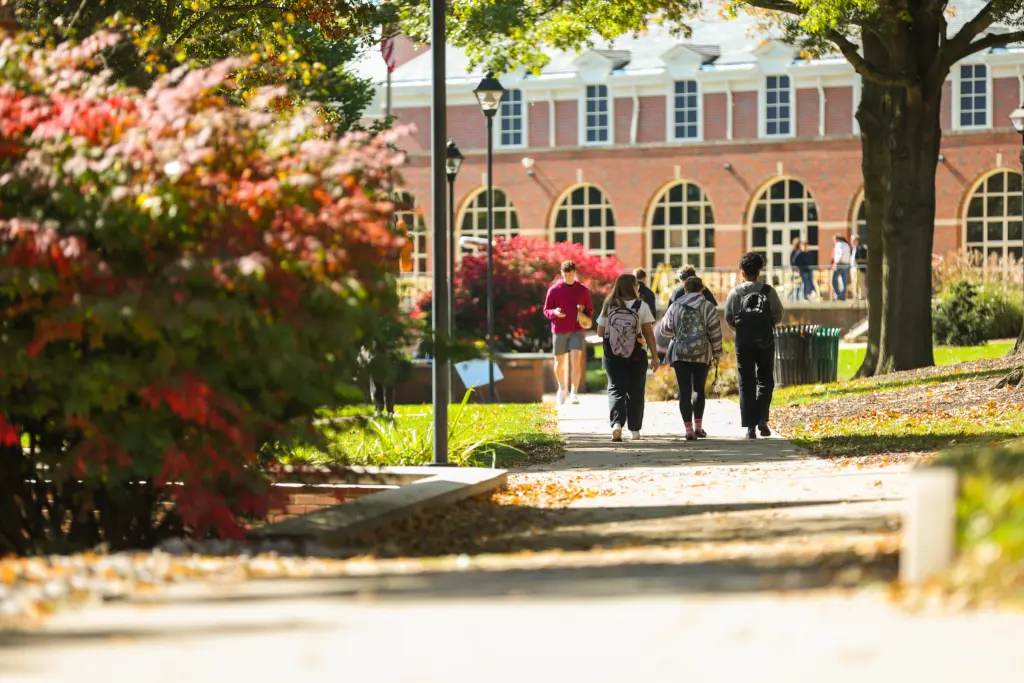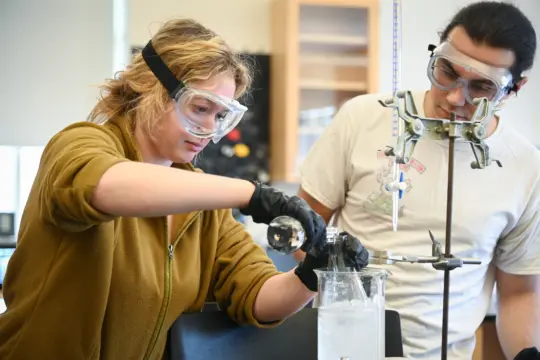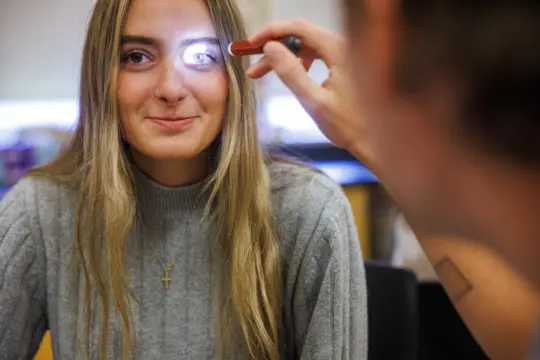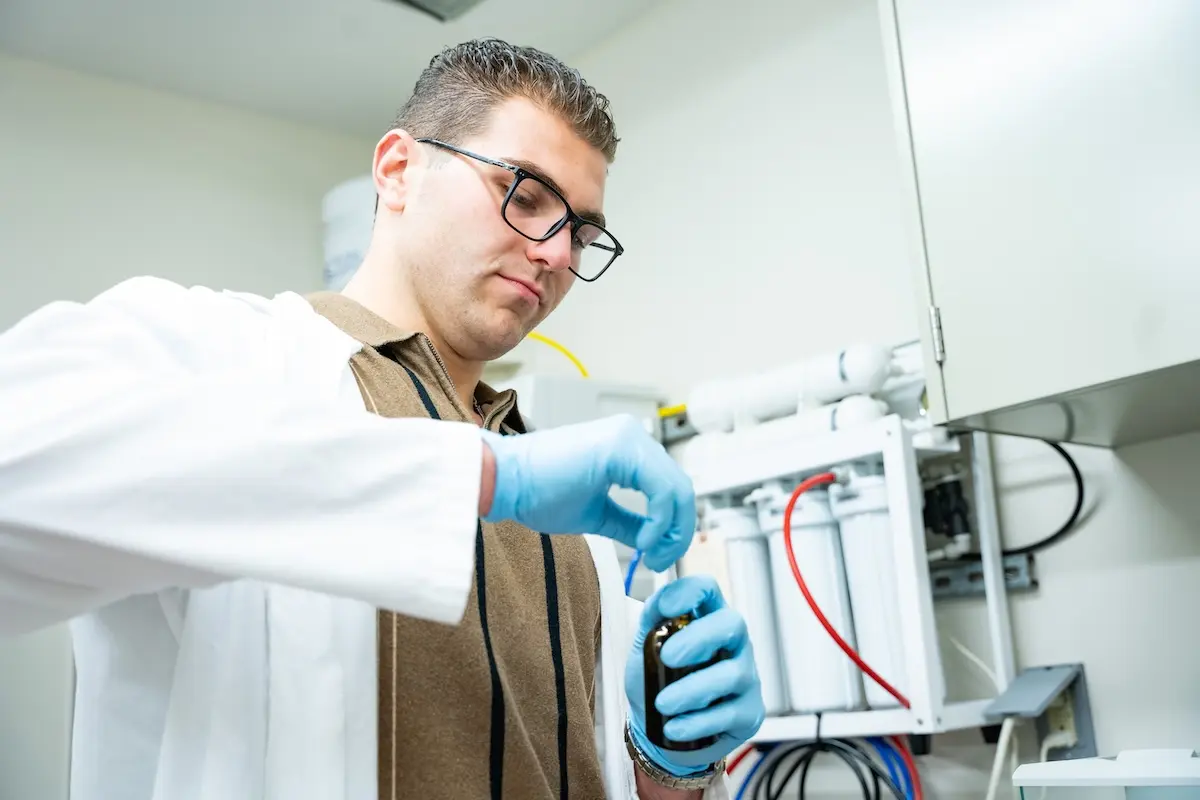
Neuroscience Degree
Are you a person who often questions, “Is it nature or nurture?” If so, neuroscience will lead you to the answers. Neuroscience is an interdisciplinary field that draws from the knowledge of biology, chemistry, physiology and psychology and seeks to understand the connection between human behavior and human biology, right down to the cellular level.
Poets and writers have surmised about human behavior for centuries, but it wasn’t until the development and popular use of brain-scanning technologies like PET scans, CT scans and MRIs at the end of the 20th century that the field of neuroscience has come into its own with astonishing, new discoveries being announced each day.
As a neuroscience major at Susquehanna University, you will have plenty of time in the lab to pursue answers to all your burning questions. And you won’t be alone. All students are supervised by a talented faculty member, who also is asking important questions. Unlike students at large research universities who vie for undergraduate research spots, you are guaranteed one at Susquehanna. Chances are you will be presenting that research at a professional conference, too. Most neuroscience majors do. When it comes time to enter the field or apply for graduate school, your advisor will be with you every step of the way.
EXCITING UNDERGRADUATE RESEARCH
Neuroscience major Katt Teles ’24 worked with her faculty mentor to study the neurological consequences of chronic consumption of a high-sugar, high-fat diet. You, too, can make startling discoveries as an undergraduate researcher.
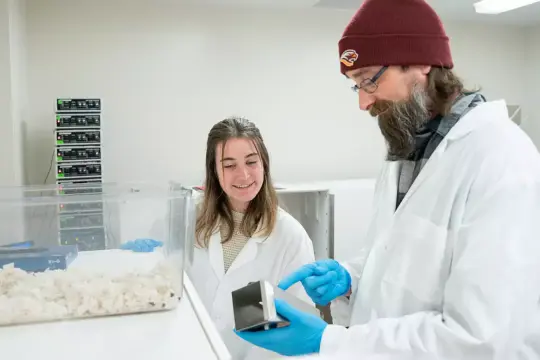
SU By the Numbers
More Than Metrics
100%
of students complete original research with a faculty advisor
100%
Faculty teaching in the major are professionals in the field
99%
of students receive financial aid through academic merit scholarships and need-based grants
Explore YOur Studies
Program Resources
A Glance Into Your Degree Pathway
With support from advisors and course planning tools, your time at Susquehanna is carefully designed to help you succeed. This example provides a glimpse into your degree experience, but you’ll have plenty of opportunities to customize your path with electives or study abroad programs that reflect your passions and career goals.
Introduces principles and theories of behavior. Topics include biopsychology, sensation and perception, learning and memory, and physical and behavioral development. Also covers personality theory and assessment, social and cultural influences on behavior, and behavior pathology and treatment. 4 SH. CC: Social Interactions.
Examination of life at the cellular level, focusing on the five core concepts of biology (evolution, structure and function, information flow, energy transformations and systems). Topics include cell structure and function, protein structure and function as the link between genotype and phenotype, information flow from gene to protein, inheritance of traits in eukaryotic organisms, membrane structure and transport, energetics on the cellular level, cell cycle control and cancer. 4 SH. 3 lecture hours. 3 laboratory hours.
Neuroscience
Choose from a variety of elective courses within this program to customize your goals.
Fundamental laws and principles, atomic structure and periodicity, bonding, molecular structure, stoichiometry, chemical reactions, energy, equilibrium, thermodynamics and nuclear chemistry. Students may receive credit for only one of the three introductory Chemistry I courses, CHEM-103 or CHEM-111. 4 SH. 3 lecture hours, 3 laboratory hours (taken as CHEM-105, not a separate credit/grade). CC: Scientific Explanations.
Basic research methods. Covers naturalistic observation, surveys, and experimental and quasi-experimental designs. Lecture and lab. Prerequisites: Sophomore standing, PSYC-101, and a statistics class (PSYC-123, BIOL/ECOL-220 or MATH-180.) 4 SH. CC: Writing Intensive.
Basic concepts of stereochemistry and chemistry of aliphatic hydrocarbons, alkyl halides and alcohols. Prerequisite: CHEM-101, CHEM-103 or CHEM-111. 4 SH. 3 lecture hours, 3 laboratory hours (taken as CHEM 221L, not a separate credit/grade).
Neuroscience
Choose from a variety of elective courses within this program to customize your goals.
Explores neurophysiological influences on behavior. Topics may include human communication, learning and memory, visual processing, ingestive behavior, sleep, emotion and stress, addiction, aggression, reproductive behavior, and neurological and neuropsychological disorders. Prerequisite: Sophomore standing and PSYC-101. 4 SH, CC: Interdisciplinary.
Using behavioral neuroscience methods and procedures to investigate action potential dynamics, neuroanatomy, visual processing, learning and memory processes, and emotion regulation. Prerequisite: PSYC-223, PSYC-342 to be taken concurrently or as a prerequisite. 1 SH.
This course explores basic concepts of spectroscopy and chemistry of aromatic hydrocarbons, conjugated alkenes, amines, ethers, carbonyl compounds, carboxylic acid derivatives and carbohydrate building blocks. Prerequisite: CHEM-221. 4 SH. 3 lecture hours, 3 laboratory hours (taken as CHEM 222L, not a separate credit/grade). CC: Writing Intensive.
This course is a detailed look at the sophisticated cellular and molecular mechanisms in the nervous system and how these mechanisms provide the foundation for circuits and functional neuroanatomical structures capable of generating complex behaviors and physiological functions. This course connects functional cellular and anatomical units of the nervous system to behaviors typically addressed by the field of psychology, such as learning, motivation, addiction, and psychological disorders. The intial material focuses on the molecular structure and function of neurons and then builds upon this foundation by progressively assembling the functional neuroanatomical structures of the nervous system and considering the complex behaviors that these structures generate. Prerequisites: BIOL-102, PSYC-101 and junior standing or instructor’s permission. 4 SH. 3 lecture hours, 3 laboratory hours. CC: Interdisciplinary.
Neuroscience
Choose from a variety of elective courses within this program to customize your goals.
Neuroscience Student Research I introduces students to methods and techniques of neuroscience research in the context of a collaborative research project. Prerequisite: Senior standing in neuroscience or instructor’s permission. Capstone. 4 SH.
Neuroscience
Choose from a variety of elective courses within this program to customize your goals.
Collaborative research with an emphasis on presentation of data and explanation of results. Prerequisite: NEUR-510 or instructor’s permission. CC: Writing Intensive.
This course introduces students to the interdisciplinary field of neuroscience: the study of the neural basis of complex behavioral and cognitive phenomena. This course includes a laboratory component where students will be actively engaged in the process of scientific inquiry. 4 SH. CC: Scientific Explanations.
This course introduces students to the interdisciplinary field of neuroscience: the study of the neural basis of complex behavioral and cognitive phenomena. This course includes a laboratory component where students will be actively engaged in the process of scientific inquiry. 4 SH. CC: Scientific Explanations.
Varying topics reflecting student and instructor interest. Possible topics could include developmental neurobiology and diseases of the brain. Prerequisites: NEUR-101, PSYC-101, and BIOL-102, or instructor permission. Variable credit.
Varying topics reflecting student and instructor interest. Possible topics could include developmental neurobiology and diseases of the brain. Prerequisites: NEUR-101, PSYC-101, and BIOL-102, or instructor permission. Variable credit.
Individualized academic work for qualified students under faculty direction. 1-4 SH.
Individualized academic work for qualified students under faculty direction. 1-4 SH.
Neuroscience Student Research I introduces students to methods and techniques of neuroscience research in the context of a collaborative research project. Prerequisite: Senior standing in neuroscience or instructor’s permission. Capstone. 4 SH.
Neuroscience Student Research I introduces students to methods and techniques of neuroscience research in the context of a collaborative research project. Prerequisite: Senior standing in neuroscience or instructor’s permission. Capstone. 4 SH.
Collaborative research with an emphasis on presentation of data and explanation of results. Prerequisite: NEUR-510 or instructor’s permission. CC: Writing Intensive.
Collaborative research with an emphasis on presentation of data and explanation of results. Prerequisite: NEUR-510 or instructor’s permission. CC: Writing Intensive.
When you enroll at Susquehanna, you’ll be paired with an advisor and application tool to guide you in your course planning and scheduling. The following is an excerpt from the complete course catalog. Enrolled students follow the requirements of the course catalog for the academic year in which they declare each major and/or minor, consult with their advisor(s).
Neuroscience studies
The B.S. degree in neuroscience requires 61 semester hours in biology, chemistry, and psychology, with grades of C- or better in courses counting toward the major. The program involves 37 semester hours of required major courses that serve as the major’s foundation, providing students with an understanding of the disciplines that come together to make up the field of neuroscience. In addition, the 61 semester hour total includes 12 semester hours of chemistry courses. Another 12 semester hours of upper-division electives are taken, which must include at least one course with a laboratory component. The neuroscience major capstone represents a full academic year of extended experimental investigation in collaboration with a faculty mentor. Neuroscience students will be able to complete many of their Central Curriculum requirements within the major.
37 Required Major Courses
- 4 NEUR-101 Introduction to Neuroscience
- 4 NEUR-510 Neuroscience Student Research I
- 4 NEUR-511 Neuroscience Student Research II
- 4 BIOL-102 Cell Biology and Genetics
- 4 BIOL-455 Functional Neuroanatomy
- 4 PSYC-101 Principles of Psychology
- 4 PSYC-123 Statistics for the Behavioral Sciences
- 4 PSYC-223 Research Methods in Psychology
- 4 PSYC-342 Behavioral Neuroscience
- 1 PSYC-360 Laboratory in Behavioral Neuroscience
12 Cognate Chemistry Courses
- 4 General Chemistry I (CHEM-103, CHEM-111)
- 4 General Chemistry II or Structure and Reactivity (CHEM-104 or CHEM-232)
- 4 CHEM-221 Organic Chemistry I
12 Advanced Electives (at least one elective must include a laboratory component)
- 4 BIOL-300 Developmental Biology
and BIOL-301 Developmental Biology lab - 4 BIOL-302 Comparative Vertebrate Anatomy
and BIOL-303 Comparative Vertebrate Anatomy lab - 4 BIOL-306 Cell Biology
and BIOL-307 Cell Biology lab - 4 BIOL-310 Animal Physiology
and BIOL-315 Animal and Exercise Physiology lab - 4 BIOL-316 Molecular Biology
and BIOL-317 Molecular Biology lab - 4 BIOL-318 General Biochemistry
- 4 BIOL-319 Advanced Genetics
- 4 BIOL-320 Exercise and Extreme Physiology
and BIOL-315 Animal and Exercise Physiology lab - 4 BIOL-324 Animal Behavior
and BIOL-325 Animal Behavior lab - 4 BIOL-400 Immunology
and BIOL-401 Immunology lab - 4 BIOL-440 Behavioral Neuroendocrinology
and BIOL-441 Behavioral Neuroendocrinology lab - 4 CHEM-302 Medicinal Chemistry
- 4 BIOL-424/CHEM-424 The Biochemistry of Metabolism
and BIOL-429/CHEM-429 The Biochemistry of Metabolism lab - 4 BIOL-422/CHEM-422 The Biochemistry of Nucleic Acid
and BIOL-423/CHEM-423 The Biochemistry of Nucleic Acid lab - 4 BIOL-426/CHEM-426 The Biochemistry of Proteins and Enzymes
and BIOL-427/CHEM-427 The Biochemistry of Proteins and Enzymes lab - 4 HLCR-302 Human Physiology
- 4 NEUR-500 Topics in Neuroscience
- 4 PHIL-228 Neuroethics
- 4 PHIL-315 Philosophy of Mind
- 4 PSYC-320 Psychological Disorders
- 4 PSYC-340 Cognitive Psychology
- 4 PSYC-344 Learning Processes
- 4 PSYC-346 Sensation and Perception
- 4 PSYC-348 Psycholinguistics
- 1 PSYC-361 Laboratory in Cognitive Psychology
- 1 PSYC-362 Laboratory in Learning Processes
- 1 PSYC-363 Laboratory in Sensation and Perception
Honors in Neuroscience
The departmental honors program encourages and recognizes outstanding performance in neuroscience. To graduate with honors in neuroscience, students must do the following:
- Complete all of the requirements for the major
- Have an overall cumulative GPA of 3.25 and a neuroscience GPA of 3.50
- Osteopath
- Nurse
- Pharmacist
- Research assistant
- Physician assistant
Recent Employers
Beyond Susquehanna
Where Passion Meets Purpose
Straight from the Nest


“Something that stands out to me a lot about the neuroscience major is just how interdisciplinary it is. Being able to take classes in biology, psychology and chemistry gives you a wide variety of experiences that help people figure out what they’d specifically want to do with the major. Students get a lot of different research experience and the opportunity to get more clinical experience as well if you’re interested in a more medical field.”
— Caitlin Grosch ’25
“The community at Susquehanna is just so tight-knit and it’s not a school where you fall through the cracks. Everyone knows everyone. Your professors and your peers care about you so much, and it’s just such a close family.”
— Beth Grove ’25
Meet the Faculty
TAKE A VIRTUAL TOUR
Launch Natural Sciences CenterYOU MAY ALSO BE INTERESTED IN
See the full list of related programs on the School of Natural and Social Sciences page.
Have Questions?
Contact Us
Start your journey.
